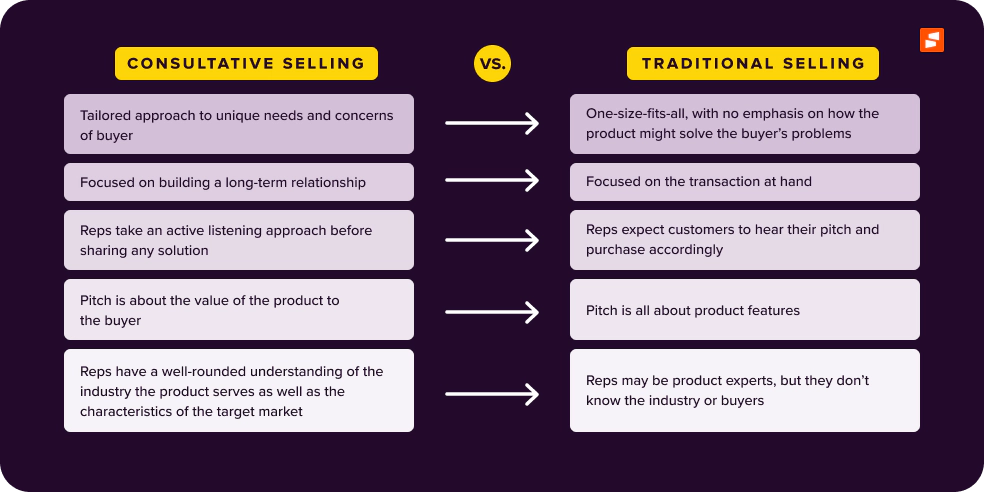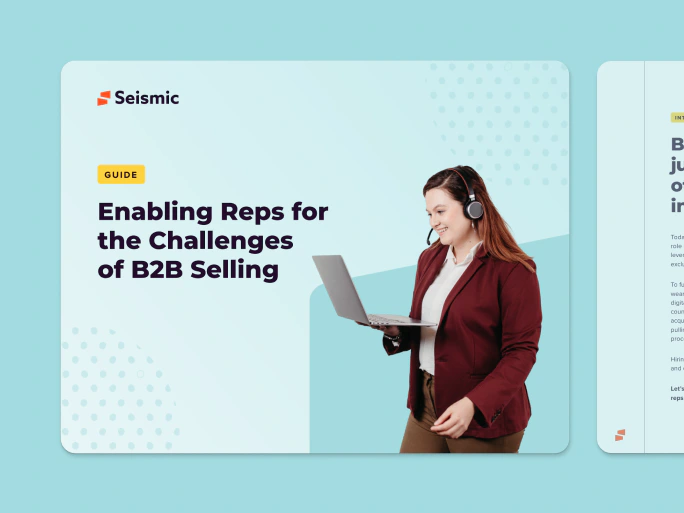The consultative selling definition
Think about the last time you made a significant purchase. Whether it was buying software at work or a car for your family, you probably dealt with a number of sellers before you made a final decision. Throughout the process, did you find yourself avoiding a pushy and overwhelming sales rep? Or, were you lucky to work with a rep who took the time to listen to your needs, answer questions, and provide a personalized experience?
If you interacted with the latter type of seller, then you experienced consultative selling firsthand. Consultative selling refers to an effective sales technique that encourages sellers to build customer relationships, develop trust, and provide expert advice. Rather than pitching a product or service and completing an impersonal transaction, sellers take the time to fully understand their customer’s needs and then identify how their product or service can help them achieve their goals.
Commonly referred to as needs-based selling, reps who follow a consultative selling approach act more like consultants rather than sellers. They tailor their messages and the solution to each customer instead of using a one-size-fits-all strategy.
Consultative vs. traditional sales
Transactional selling has traditionally relied on aggressive pitches with minimal attention to the buyer’s needs in order to close deals quickly. A consultative selling strategy prioritizes relationships, where sales reps listen to buyers, identify their pain points, and offer custom ideas. Here’s a look at some of the key differences between these two sales approaches.

The benefits of consultative selling
Consultative selling has transformed the way sellers approach buyers. But, it’s not only beneficial to reps themselves, it’s also helpful for companies and buyers. Here’s a glimpse at some advantages of consultative selling.
Higher customer satisfaction
Customers who feel heard and understood are more likely to have a positive experience during the sales cycle. And that keeps them coming back. In fact, 84% of buyers are more likely to buy from sellers who understand their goals.
Improved conversion rates
According to Forrester, 80% of business executives are more likely to purchase a product or service as a result of a consultative sales experience.
Increased efficiency
More than half of sellers say that a consultative approach makes their sales process more efficient. By listening actively, a rep can more quickly tailor the solution to customers and reduce the need for numerous follow-ups.
Repeat or long-term customers
Giving buyers the experience they want is a huge advantage that can lead to long-term success. Consultative selling meets the needs of buyers and therefore fosters greater customer loyalty. 91% of respondents in a Salesforce survey indicated they are more likely to make repeat purchases after a good experience.
Enabling Reps for Sales Challenges

How it works: The consultative selling process
The typical consultative sales process is designed to help sellers qualify leads, build relationships with prospects, and close deals. Let’s take a closer look at an effective consultative selling framework to better understand what sellers need to do in order to be successful.
Research and prepare
The consultative process starts before a seller even speaks to a prospect. First, it’s mission-critical to thoroughly research their industry, role, and company. Review their LinkedIn profile, take a look at the company website, check out the CRM for any historical interactions. By understanding the ecosystem that prospects live in day-to-day, reps can offer insightful, informed guidance and speak to how their solution can deliver results.
Connect with the buyer
Meet the buyer in a way that works best for them. Some busy buyers may prefer email at first, while others will want to connect via phone or on a virtual meeting. Regardless of how you connect, focus on establishing a genuine relationship that encourages open sharing of goals and challenges.
Understand their needs
When talking with buyers, work to create a conversational atmosphere. Start by asking open-ended consultative selling questions and follow-up in a way that encourages elaboration. The goal is to clearly identify their pain points so you can better recommend the right solution for their use case.
Deliver helpful information
A core part of consultative selling is the ability to offer valuable insight that goes beyond the product itself. This might include perspectives on the product or the industry itself. This starts with active listening to understand their questions or knowledge gaps. Then tailor your pitch and provide personalized information based on their circumstances. All of this demonstrates that you’re invested in their success and not just trying to make a sale.
Become a trusted partner
Consultative selling is a collaborative process. It focuses on working together to identify the problem and how your solution can best solve it. This may involve brainstorming, exploring different options, and finding creative ways to overcome obstacles.
Continue to follow up
The relationship shouldn’t end once a deal closes. It’s important for reps to stay responsive and check in regularly with updates or to answer questions. By maintaining a strong, dynamic relationship with customers, reps are more likely to drive strong satisfaction and repeat business.
Consultative sales techniques and best practices
Sellers don’t become consultative sellers overnight. Developing winning consultative selling techniques can help improve sellers’ success over time. And, it takes a commitment to training and a strong learning and coaching program to perfect consultative selling skills. Here’s a glimpse at some crucial soft skills and best practices.
- Practice active listening: This means sellers should listen more and talk less so prospects feel heard. Hubspot recommends the following framework for active listening:
- Acknowledge the prospect’s needs
- Confirm your understanding of the prospect’s needs
- Clarify your understanding of their needs
- Ask thoughtful, open-ended questions: Open-ended questions encourage the buyer to provide detailed responses. It can also provide a lot of helpful information that will enable you to predict and overcome objections and get the deal to the finish line. Brainstorm questions for discovery and create a list of sales pitch questions and answers that will get prospects talking.
- Lead with authenticity and empathy: Most people can easily tell when someone is insincere. By showing genuine authenticity and empathy, consultative sellers can establish a genuine rapport with buyers. Therefore, sales leaders should provide learning and coaching programs that focus on learning and honing empathy.
- Provide insights and context: Reps can wow prospects by sharing insider information they might not have. For example, incorporate knowledge on how other people in similar roles solve their challenges or interesting data on customers in their space. Sharing something that buyers wouldn’t find out otherwise helps sellers differentiate themselves and stand out from competitors.
Never stop growing
How to improve your consultative approach
If you’re looking to improve your team’s consultative sales skills, there are several strategies sellers can use to become more effective.
- Hone consultative selling skills: First, sales leaders and enablement teams should build a thorough consultative selling training program. Explain to sellers why this approach works and then train them on effective selling techniques and best practices. It’s also important to focus on those critical sales skills we mentioned earlier. Give sellers the opportunity to learn and practice the skills in their training environment before they interact with buyers.
- Embrace social selling: Social selling involves using social media platforms to engage prospects, share content, and establish your team as thought leaders in your industry.
- Incorporate the right enablement tools: Enablement tools streamline your sales process, automate routine tasks, and provide data-backed insights. Sales content management tools help reps easily access supportive content, such as a consultative selling script and messaging, so they can prepare for every conversation with a buyer.
Build a team of trusted sellers
Becoming an effective consultative seller requires a combination of skills, strategies, and tools. The Seismic Enablement Cloud™ helps sales teams improve their approach in several ways. First, our content management tools empower reps to discover and share engaging, personalized, and helpful content throughout the buyer’s journey. And with learning and coaching, reps can learn and practice important consultative selling skills and receive coaching along the way so they can deliver a better consultative experience to buyers. Interested in learning more? Get a demo to start honing your team’s consultative approach to selling.



